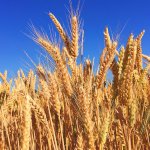National Wheat Day in Brazil Date in the current year: November 10, 2026
 National Wheat Day (Dia Nacional do Trigo) is celebrated in Brazil on November 10 every year. It was created to highlight the importance of wheat and recognize the hard work of farmers who grow it.
National Wheat Day (Dia Nacional do Trigo) is celebrated in Brazil on November 10 every year. It was created to highlight the importance of wheat and recognize the hard work of farmers who grow it.Wheat is a cereal grain that is a worldwide staple food. It is grown on more land area than any other food crop in the world and is the second most-produced cereal after maize. Wheat is the leading source of vegetable protein and an important source of carbohydrates in human diet. When consumed as a whole grain, it is also a source of dietary fiber and various nutrients.
Wheat can be ground into flour or semolina, germinated and than dried to produce malt, or used to produce cracked wheat and bulgur. It is a major ingredient in a wide range of foods including bread and other baked goods (cakes, cookies, crackers, donuts, muffins, pancakes, pastries, pies, pizza crust, and many more), breakfast cereals and muesli, pasta, alcoholic beverages (vodka and some types of beer), gravy, etc.
Given its status as a staple grain, wheat is one of the biggest crops in the international grain trade, alongside maize, rice, and soybean. The world’s largest producers of wheat are China, India, Russia, the United States, France, Ukraine, and Pakistan; the largest exporters are the United States, Australia, Canada, France, Russia, Argentina, Germany, Romania, and India. Although Brazil isn’t on either of these lists, wheat production is an important part of its agricultural production.
Historically, agriculture has played a significant role in Brazil’s economy. The country is one of the world’s largest producers of açaí, avocado, banana, beans, Brazil nut, cashew, cocoa, coconut, cotton, guaraná, guava, coffee, lemon, maize, mango, orange, papaya, persimmon, pineapple, rice, sorghum, soy, sugarcane, tangerine, tobacco, tomato, watermelon, and some other agricultural products.
Although Brazil isn’t among the world’s top wheat producers, wheat is regarded as one of the country’s principal agricultural products, alongside beans, cattle, coffee, cotton, corn, floriculture, forestry, fruit and vegetables, rice, soy, sugarcane, and tobacco. More than 90% of wheat is produced in two of the country’s coldest states, Rio Grande do Sul and Paraná; 21% of wheat in Brazil is produced by family farmers.
Even though Brazil produces a significant amount of wheat, it does not meet the country’s consumption needs. Due to this, Brazil has to import almost twice as much wheat as it produces and is one of the largest wheat importers in the world. Most of the imported wheat comes from neighboring Argentina.
According to the Brazilian Wheat Industry Association (Associação Brasileira da Indústria do Trigo, Arbitrigo), the country’s wheat production has increased significantly over the past decade due to the introduction of new agricultural techniques and improved cooperation between producers and mills, but there’s still much room for improvement.
National Wheat Day is observed in Brazil to highlight the importance of wheat as a staple crop, recognize the hard work and dedication of those growing and harvesting it, and raise awareness of the need to increase the production of wheat in order to reduce Brazil’s dependence on import.
- Category
- Other Observances
- Country
- Brazil
- Tags
- National Wheat Day in Brazil, observances in Brazil, holidays in Brazil, wheat production, agriculture in Brazil